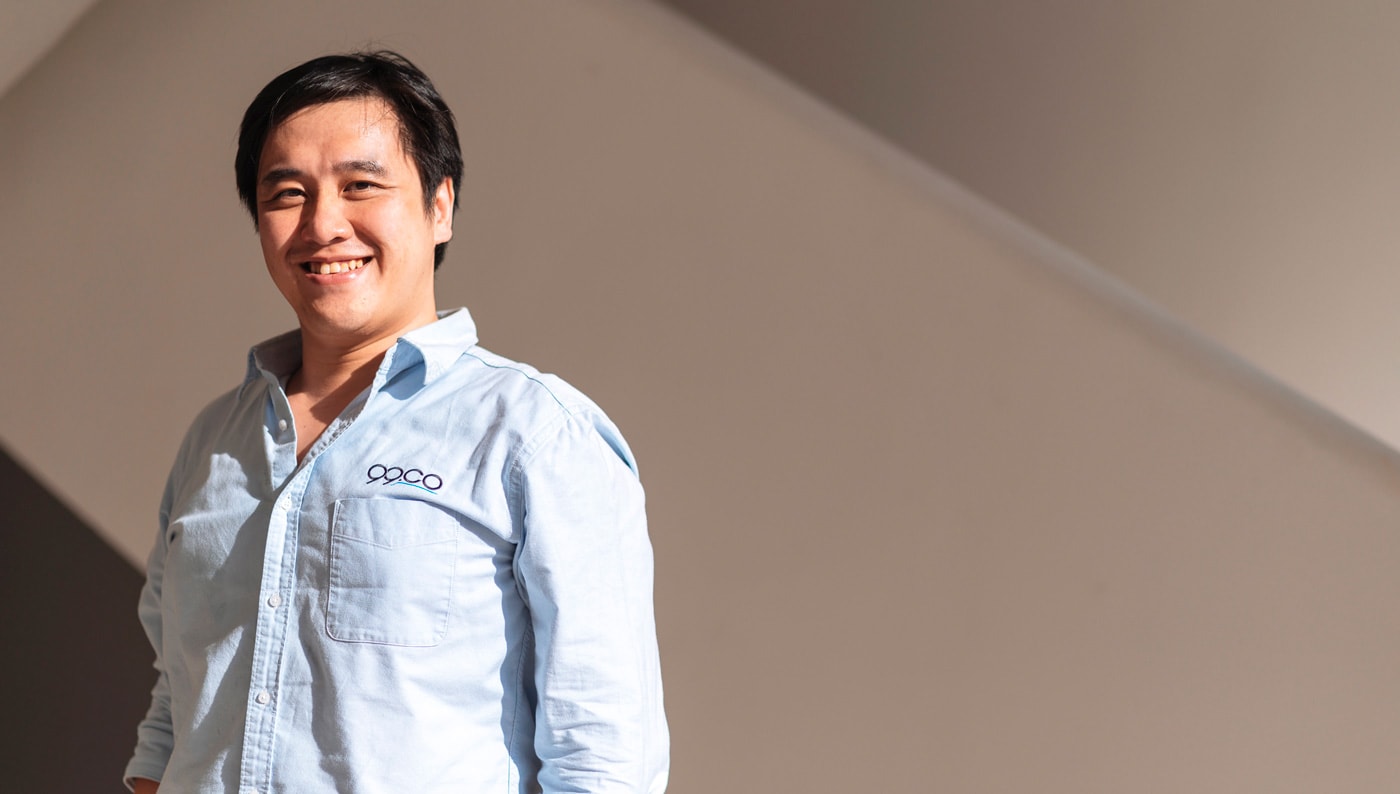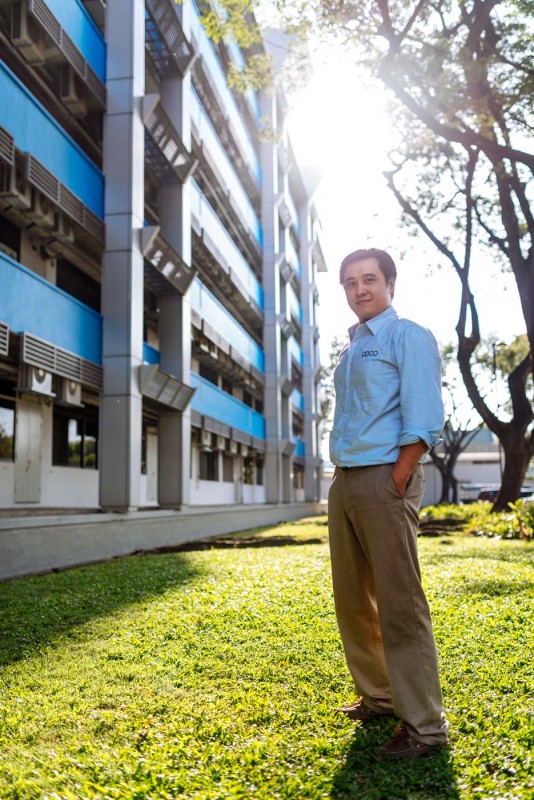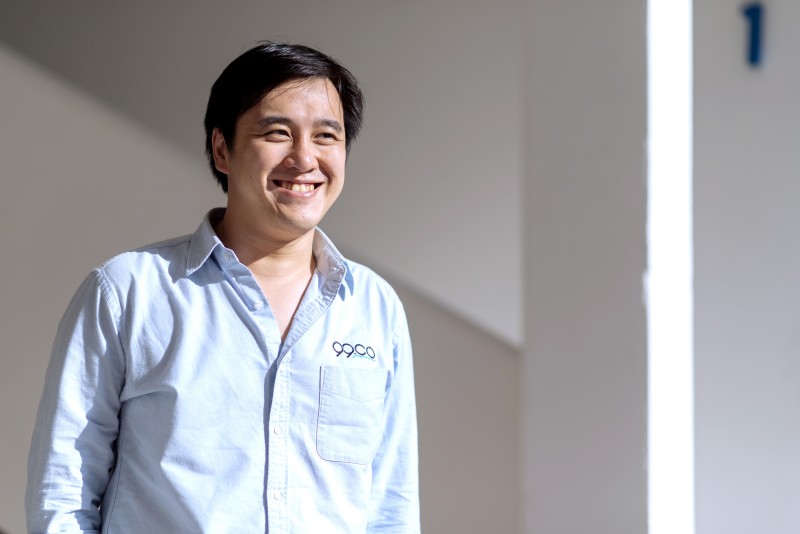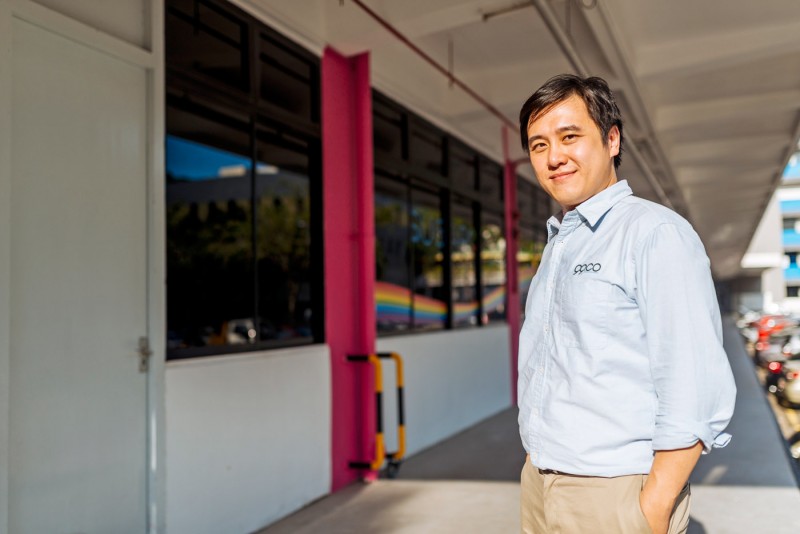Darius Cheung: Building Mission-Driven Happiness

Darius Cheung scans the world for problems and once he identifies one worth fixing, he goes off like Bob the Builder. Sure enough, he uses the verb liberally. When his attention shifts to you, his eyes twinkle, examining you like a spotlight. His spotlight is now on property search.
“I’m a very impulsive person.” he declares. “When a Hi-fi set arrives, some people read the whole manual before they do anything. My instinct is to press the first button I see.” His child-like candour grows on you, and it quickly dawns on you that he harbours a utopian oasis in his mind. I can see why he builds happy communities. “In the fourth year of tenCube, everything was clicking: the product was growing, the team was growing, and we were profitable,” he reminiscences. “We were having a lot of fun. To go back to that is a big part of the motivation.” The theme song of the children’s show likely represents his thought processes. For good measure:
Take your places
Can we fix it
Yes, we can
Bob the Builder
Can we fix it
Bob the Builder
Yes, we can
Scoop, Muck and Dizzy and Roley too
Lofty and Wendy join the crew
Bob and the gang have so much fun
Working together, they get the job done
He is deliberate and thoughtful, often pausing for moments before speaking, and punctuating with laughter. He doesn’t know what fulfills him. Perhaps it’s the freedom to solve problems and make an impact. “The main difference is in the mind. Now, I have the liberty to think about what I can do that is really impactful, whereas the first time was about survival,” referring to the acquisition of his first company, tenCube by McAfee. We scout around the BLK71 compound for spots to shoot him. “Wanna jump in?” I suggest, referring to the rubbish dump sitting in the car park. Our lens man thinks it’s a great idea. I half-expect him to hop in.
YONG HUI YOW: How are things going with 99.co?
DARIUS CHEUNG: Pretty good! We’re seeing growth every month across all metrics: about 25 per cent a month. We have about 200,000 unique visitors a month. That’s decent, but not very good. The number of people who go through our system and enquire about properties is also growing well, but the aspect which we’re happiest about is the satisfaction people get from using our product.
YONG HUI: What happened to BillPin?
DARIUS: I’d consider BillPin a failed project. It started off casually, and gradually turned into something more serious. It was built on the hypothesis that it would be viral, and potentially become a payments or mobile wallet company. However, we realised the built-in virality wasn’t as effective as we thought it would be.
YONG HUI: Why did you choose to tackle the property market?
DARIUS: I was looking for a place myself, and some of my team members were too. Having gone through that of renting over the past 20 years, and buying a place in the last two, I can say the experience wasn’t great. It can be unreliable and tedious, which is why something had to be done to fix it.
YONG HUI: What are the main problems you saw?
DARIUS: A few problems. Generally, if you ask a consumer, they’ll say there are a lot of fake listings, duplicate listings, sometimes agents don’t respond, or the place doesn’t turn out the way it’s been described. Sometimes, even the number of bathrooms or rooms can be wrong. All of these issues make it difficult to do a proper search. This leads to a second problem, which is the bigger problem – if you don’t have an accurate way to search, you’re not making very good decisions. You might be making sub-optimal decisions. For example, if you are not able to live 15 minutes closer to your workplace, that’s 15 minutes of your life you could have saved.
YONG HUI: How do you charge?
DARIUS: We charge a flat fee. We think that’s the right model. If you look at all the classified sites, and the respective verticals such as property, jobs, and cars that were built 7, 8 or 10 years ago – essentially, the first generation of classified sites, their monetisation model is ‘pay to list’. It could be free, but they almost always have a freemium feature. The more you pay, the higher you rank. In some cases, it gets pretty extreme. However, if the thing that gets them to the top spot is not customer satisfaction, and in this case, listing quality, then that obviously will get neglected. The right way to fix this is to have an incentive system where real estate agents who list properties will over time learn how to do better jobs – a system where whatever the customer appreciates get ranks higher.
YONG HUI: What are some things 99.co has learned?
DARIUS: Over time, the way Google ranks their pages has gotten much, much more sophisticated, and much harder to understand, but essentially, their philosophy has remained the same – what consumers want. All that matters is what consumers are searching for, and whether we are giving them the right answers. For us, it’s the same philosophy. Some very hard factors are obvious: the quality of the pictures, the number of pictures, but we also noticed certain plateaus. For example, after 10 pictures, it doesn’t matter anymore because the consumer does not want to see that many. They need about 5, 6, and sometimes 10, depending on how big the place is. If you’re a one-bedder, 5 photos are more than enough. If it’s a good class bungalow, 10 is not even enough. We also learn from our users’ behaviour, look at what gets clicked on: whether they convert? or does the user end up enquiring about the property?
YONG HUI: Let’s backtrack a bit – when you first learned McAfee wanted to acquire tenCube, how did you feel?
DARIUS: The offer from McAfee wasn’t the first. In fact, we fielded a few other offers before that. We were a lot more excited about the earlier ones. By the time McAfee contacted us, it was probably the fifth or sixth time already, so I was like: “Okay lah, don’t think it’s real.” Eventually, we proceeded to sound them out, and it turned out to be a really good fit, so we went ahead.
YONG HUI: Was it a difficult decision for you?
DARIUS: It was certainly a difficult decision because it’s not “my baby” in some sense, but a place where my team was happy working in. That’s worth a lot more to me than anything else. It was very hard… but we recognised that it was going to be very difficult for us to grow further by ourselves. So fitting into a larger company made sense for us at that time.
YONG HUI: After that, how did your life change?
DARIUS: Not much. I bought a house, which was the only thing I bought that was expensive. Everything else is the same. I still ride the same motorbike, eat the same food. The main difference is in the mind. Now, I have the liberty to think about what I can do that is really impactful, whereas the first time was about survival – how do we make something out of it; how do we make sure we’re okay.
YONG HUI: Why did you start tenCube?
DARIUS: When I was younger, I saw Yahoo take off; then hotmail, ICQ, IRC, Google, Friendster, mySpace, and Facebook. All these are world-changing things, and for the better… most of the time. I was fascinated by how these things changed the world so quickly. How you look for information completely changed when Google came along. I became very curious about the source of these things. Who builds them – how are they built? I started studying the stories of these companies. I realised they come from a place not much bigger than Singapore, built by people not smarter than us. I realised they’re mere mortals. That’s when we started feeling we should do something useful with our lives, and this is the way to do it.
YONG HUI: Did you feel you didn’t want to work for somebody else?
DARIUS: It was a good place. I liked the company, and made friends who I still keep in touch with. However, when I extrapolated 5 years, the thing that I would still be doing would not have been fulfilling to me, or sufficiently fulfilling. So, I’d rather take a chance to do something much riskier, where I might or might not succeed.
YONG HUI: What fulfills you?
DARIUS: Honestly, I don’t know what fulfills me. That’s a very hard question to answer. I went to work for a small company, and was pretty happy with the way things worked. Most of my seniors and peers went to banks, consultancies, and many other larger organisations. The majority are not happy. To me, that’s a very big motivation to try and figure out the alternative pathways.
YONG HUI: Why did you go do a second [BillPin] and a third one [99.co]?
DARIUS: Partly for the thrill. It was one of the most fun times of my life. To go back to that is a big motivating factor. For me, one of the best things to do is to build a start-up.
YONG HUI: Do you want to build a very big company?
DARIUS: Not necessarily. I don’t think being big is the goal in itself.
YONG HUI: Is happy the goal?
DARIUS: Happiness is for sure a part of the environment we want. Big, is however, not unimportant. To make a real impact, ‘big’ is part of what we need to be. Making an impact makes us happy. We would measure ourselves in terms of the impact we make.
YONG HUI: How much of it is luck?
DARIUS: Luck is not an addition question; it’s a multiplication question. You need both luck and hard work. If your luck is zero, but your hard work is 100, it’s still zero. If your luck is 100, and your hard work is zero, it’s still zero.
YONG HUI: What are some things you’d do to change the local start-up scene.
DARIUS: One, make EP [Entrepreneur Pass] a lot easier to get, because talent is our number one problem. There are other ways to solve this, but most of them are not going to be impactful enough. Second thing: make rents cheaper. It is ridiculously expensive to rent. Office rents are not bad because JTC has done a great job building up BLK71 and 79, but residential rents for entrepreneurs, and for people working on start-ups are very expensive.
YONG HUI: What do you recommend?
DARIUS: What we need now is a residential hub around BLK 71 and 79, so entrepreneurs can live together. Great start-ups get started in dorm rooms because great minds gather at one place at night, over a poker table and drinks.
YONG HUI: And showers.
DARIUS: That’s optional. [laughs] I don’t know if people want to shower together, but certainly in a casual non-work, non-serious setting — that’s where the real stuff happens.
YONG HUI: You probably have many ideas. What makes one idea more worthy of executing over another?
DARIUS: Jim Collins does a pretty good job with this with ‘The Hedgehog Concept’, which says what you should do with your life is a crossover of three things: 1) What the world needs, 2) What you can actually do, and 3) What makes money and is sustainable and profitable to do. I think this is a good framework to use.
YONG HUI: Is this something you adhere to?
DARIUS: Not consciously. I’m a very impulsive person. When a Hi-fi set arrives, some people read the whole manual before they do anything. My instinct is to press the first button I see.
YONG HUI: Are you married? Or have kids?
DARIUS: No, I’m single – no kids.
YONG HUI: Do you want to have a family?
DARIUS: One of the biggest pieces of sacrifice for doing a start-up is this. It’s not necessarily true that all start-up people cannot get married and have kids, but it certainly takes a toll on time, and what else you can do with your time. I’m conscious of the sacrifices. It’s not that I don’t want a family, but I don’t see it happening at this point of time.
YONG HUI: You wrote an article, ‘The Gold Digger’s Pants’. What are the gold digger’s pants nowadays?
DARIUS: Ah, interesting. Let me think about it… I think it’s a lot around technical infrastructure, and data centres’ optimisation software – not areas I’m actually good at or an expert at, but I know there’s plenty of need for them. Those are things which don’t depend on what the world is going to be like tomorrow, and its whims and fancies. We’re going to need servers, no question about that.
YONG HUI: Any other pants?
DARIUS: I’m sure there are many. There was this fascinating company we saw recently. It’s called WeWork. They are a co-working space currently valued at US$5 billion. For example, they have apps to book their accountant and so on. They’ve created the business infrastructure for start-ups that use their co-working spaces. Technical and business infrastructures around start-ups are good. Everybody needs servers, an office, book-keeping, and so on. In the future, we are going to have a lot more smaller companies, soloists, people who work flexible time, people who work anywhere, any time. The whole office infrastructure is becoming virtual.
YONG HUI: What do you think of working from home?
DARIUS: I like working from home, but I think going to the office is also necessary for team-building.
YONG HUI: Do you allow your team to work from home?
DARIUS: Yeah, usually.
YONG HUI: Do you think there’s room for more tech media in Singapore aside from the two major players?
DARIUS: The question to ask is: Is there a viable revenue model for a third player?’ That’s questionable. Unless there is a specific formula, I wouldn’t suggest it. If it’s based on advertising dollars from large companies and VC firms, I don’t think that’s a very good model. That said, I think the media is evolving tremendously. I don’t think traditional media works. By the way, I’m a GigaOm supporter. They were much better than TechCrunch, but they couldn’t make money so they went out of business.
YONG HUI: Do you think long-form journalism has had it?
DARIUS: No. But someone has to fund it. There will be people who don’t need money. I think people who do long-form journalism are not those who go after money. I find it very hard to figure out how long-form journalism can be very profitable. But, there will be people who care, and there will be an audience. I’m one of them. I think the future will be diverse. There won’t be one answer.
YONG HUI: What do you think of BuzzFeed?
DARIUS: It’s fucking genius. You’re either really impressed or really hate them. I’m really impressed and also really hate them. [laughs]
YONG HUI: Do you think they add real value?
DARIUS: No! [laughs] But they’re still bloody genius! It seems the first step is to build an audience, and then you get serious about journalism.
YONG HUI: What are the ugly sides of start-ups you’ve seen?
DARIUS: There are a lot of ugly sides. Some fail quite catastrophically. They are in debt, credit card debts, after maxing out multiple cards to fund their start-ups.
YONG HUI: What do you think of that?
DARIUS: Well, the world is advanced by unreasonable people, crazy people. That’s why I’m a bit schizophrenic about this. I’d advise most people not to do a start-up, and that’s because most people are most people. If despite that, you still want to do it, then do it. These people who are the rare ones amongst us are the ones who will push the world forward. All we can do is to support them.
YONG HUI: What are some of the most catastrophic stories you’ve heard?
DARIUS: People have killed themselves.
YONG HUI: Someone you know personally?
DARIUS: It wasn’t directly because of a failed start-up, but it contributed. It happens. There are stories like this.
YONG HUI: How about ugly sides of people, such as fighting over money?
DARIUS: These things exist. I think we were lucky we did not encounter such situations. To avoid it, we were very transparent, everyone had stock, and everybody had a fair return.
YONG HUI: Is it true that you’re always reminded of your own mortality?
DARIUS: Yes, it [death] absolutely bugs me. I’m scared to death about death — what a weird way to put this. Yet, at the same time, I can appreciate that mortality is one of the best inventions of life because it pushes you to make conscious decisions, to make the most use of what you have. Scarcity makes you creative.
YONG HUI: Are you afraid of dying because you haven’t done everything you want?
DARIUS: I never will.
YONG HUI: What is it that you want to achieve before you will be ‘happy’ to die?
DARIUS: I don’t think I’ll ever be happy to die. There will always be problems to fix in the world.
YONG HUI: Any last words?
DARIUS: They would only be appropriate if they were truly last right?
YONG HUI: For this interview.
DARIUS: [laughs] Right! Considering the passing of Lee Kuan yew, it is reflective for me to see what one person can do in a lifetime. I think Singapore is the ultimate start-up. If you can do that with a country, there’s a lot more that you can do with a few determined people. We have the luxury of building on this platform that’s been handed to us.




